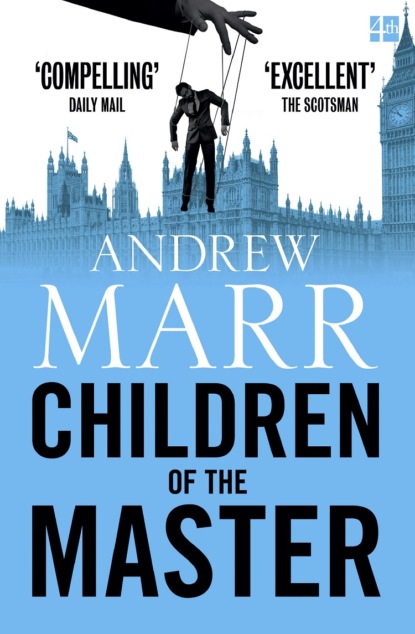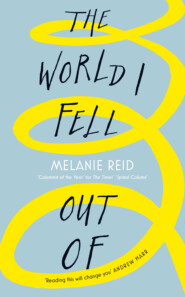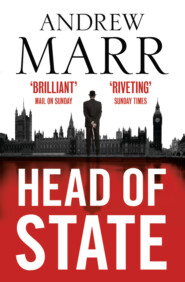По всем вопросам обращайтесь на: info@litportal.ru
(©) 2003-2024.
✖
Children of the Master
Автор
Год написания книги
2018
Настройки чтения
Размер шрифта
Высота строк
Поля
‘Yes, yes, mock away. Now I’m calling you “the future of Britain”, which I think trumps that, doesn’t it?’
There was definitely something in her ear. Itchy.
‘Peter, it’s early. I’m heading off for a busy day. How can I help you?’
‘Not just a busy day. This is a momentous day, Caroline – I can still call you Caroline, I hope – and I just wanted to know exactly how momentous. We’re bidding for the first proper interview after you’ve moved into Number 10. I’d talk to your press people, but I wanted to give you a heads-up myself.’
‘I’ll get somebody to call you later, Peter, I promise. I’m all at sea myself, as I’m sure you’ll understand.’
‘Have you spoken to Angela? In your position, with all the resources of the Home Office, you must …’
‘Goodbye, Peter.’
Loathsome man. But if Peter Quint was fawning on her to that extent, she must be home free.
The house phone began to warble again. Caro glanced at the number, and let it ring. She allowed herself to think properly about David Petrie, his Scottish joking and his dark, long-lashed, girlish eyes. Gay men, she knew, tended to like him. In all truth, before the past twenty-four hours he had hardly even looked at her, and had probably hated her on principle. But he’d made her heart race, long before they’d spoken properly, because of his naked, contemptuous and threatening ambition. Well, that was another unopenable door safely closed. And, after all, neither of them was free. He was married, and untainted by scandal. And she was famous for the other thing. No, it was completely impossible at every level. It couldn’t be happening.
As she opened the front door, Caro drained the last of her coffee, and smiled briefly to herself. She would need David Petrie in the months ahead. That last little undefined crack of possibility kept her cheerful. The car was waiting. The office had sent the Rover, she hoped with Paul inside.
There was just one photographer outside on the pavement. She couldn’t see any camera crews. Good. Fixing her face into a smile, she walked through the door and into the midst of half a dozen men who’d presumably been crouching behind the low brick front wall, and who now leapt into the air like a ragged rugby lineout. She reeled back slightly to avoid being hit in the face by a camera, and closed her ears to the sudden hubbub of questions, spittle-flecked lobs of sound – ‘Oi, wha’ say, Caroline?’ – ‘Arter a job?’ – ‘Oo’s ya boss?’ – ‘Yah-yah-yah?’
She remembered what the Master always advised: ‘Whatever they say, keep smiling. Wave at them. Smile, smile, smile. They’re looking for a guilty or an angry face – that’s what sells a photo to the picture desk. Smiles are small change.’
So that was what she did, not even flinching when one snapper, scurrying to get the best angle, banged against the wing mirror of the waiting car and knocked it off.
All the paps had their own personal tricks: one of them specialised in walking backwards in front of his target, and then appearing to trip and fall. The innocent victim would automatically reach forward, with a look of concern or shock, to catch him; and that was the picture the snapper had been waiting for – that grimace, that moment of shock. The snapper snapped fast, even as he was going down. More Westminster careers had started to slide downwards, the Master had told her, after a distorted face appeared in the papers, than had ever been destroyed by parliamentary inquiries.
Once she was inside the car, buckling up, Caro held her smile. Paul was driving. As the car pulled off, with hands banging on the roof, she closed her eyes and tried to remember her last peaceful moment that morning.
Leaving the house, she had passed a wall of pictures and photos. There were snaps of Devon, of Angela, the boys. A Peter Brookes cartoon from The Times that showed her in a pulpit. A pin board just inside the front door was covered with scraps torn from newspapers, and other mementoes. Prominent among them was a stained, creased cardboard invitation, engraved with gold leaf and signed by the Master himself. He’d given it to her, and told her to keep it safe: ‘That’s where it all began.’
Absolutely No Partners (#uacd61d67-a921-5438-be09-f9ffffde787b)
For the politician, every party, every social engagement, is a puzzle, a crossword to be solved. There are hidden clues, connections to be made, information to be passed on. You solve the puzzle. And then you leave.
The Master
Ten years earlier, when the new century was still a kid, that invitation had been new, stiff and with a thin line of gold leaf around its edges – just one of several hundred dropping that morning into letterboxes around London, Edinburgh, the Cotswolds. Each had the name of the recipient handwritten at the top in faultless italic, clearly by an expensive fountain pen held by an expensively educated hand. Then came swirls of black, embossed Gothic print. ‘Neil Savage invites you to his All Hallows Party. Formal wear. Absolutely no partners. Refusals only.’
The party had been held at Worcestershire Hall, in Worcester Square, Mayfair. One of the last grand Edwardian houses still in private hands in central London, the address underlined the lavish nature of the invitation, and refusals had been few. Neil Savage – more properly, Lord Lupin – was not, in any case, a man accustomed to being refused. Private banker, art collector, philanthropist, crossbench peer, he was known for his foul temper and his brilliant wit. ‘Often disliked, never ignored,’ he said of himself, with intense satisfaction.
And that Halloween, as the black German limousines nudged one another around the dark and windy square, the party had begun with a certain style. Young men, their gold-sprayed torsos bare despite the cold, stood at intervals along the front of Worcestershire Hall holding blazing torches, so the arrivals had to squint against the billows of smoke, and brush small embers off their clothes. Straggling up the Portland stone stairs and into the house, they were greeted by servants in white tie and tails offering cocktails with squid ink and peppers, vodka and absinthe. Champagne was available for the weak-stomached.
Lord Lupin himself, dressed all in black with a red bow tie, whiskers painted onto his chalky face, gave a passable imitation of Mephistopheles as he greeted the guests one by one. In they flowed: one former prime minister – no, two former prime ministers; half a dozen other senior politicians from each party; once-feared newspaper editors; minor royals, portly and inclined to be affable; radical playwrights with long, well-cut grey hair; radical establishment artists who made large plastic eggs for the Chinese market; gelded rock musicians; celebrated lawyers; notorious bankers … plus, of course, the shadowy PR men who kept the country moving – in the wrong direction. By 7.30 p.m. it was already clear that this was a party like no other; not a single face here, not one, was anything other than exceedingly famous.
In those days Worcestershire Hall had not yet been gutted; but it was dilapidated. Chilly, underlit rooms, with dusty curtains and dirty Dutch pictures, led off from one another in endless confusion. ‘No Old Masters here, I’m afraid. Just Old Pupils. The family …’ Lupin said. Dark little staircases spiralled up and down, apparently pointlessly. Only when the guests reached the old ballroom, laid out for a feast and glittering with hundreds of wax candles, was there any real glow of welcome. At one end, a small Baroque orchestra was playing melancholy and haunting music, a tripping gavotte, a dying fall. In front of the orchestra, exquisite young men and women dressed as satyrs and fauns were performing some old, complicated dance, as if in a Peter Greenaway film.
The guests gathered in knots, broke up again and re-formed as they circulated around the house. In even the most neglected rooms there was always a candelabra and a sofa, where a journalist or a photographer might be placed. The flashes of photography ricocheted through the house like perpetual lesser lightning. And there was plenty to photograph – all those seamed, creased, famous faces: the curving eyebrows and drawn, tortured, gathered-up and stitched flesh of actresses better known for who they had bedded than for their talent; the pendulous, hairy jowls and stained-toothed smiles of public servants. There a law officer, here a criminal; and here the two together, a hand resting lightly on a shoulder. Swarming through the dark honeycomb of the house, human crocodiles, human lampreys, human prairie dogs, all jostling and snapping when they spoke.
And, just as there was plenty to capture, so there was plenty to speak about, so many old friends to discover. Stories of old political battles, long-forgotten legal suits and complicated love tangles were being rehearsed as the drink disappeared. Good old Burgundies, flinty unoaked and vintage Chardonnays circulated on the silver trays – sweet, succulent southern sunshine for gaping, dusty northern gullets. For those who preferred, the best Islay malts and vintage brandies were there to scald and burn on the way down. The massive mahogany table at one end of the ballroom was expertly stripped by the beautiful staff, who brought round plates of bloody grouse, like the aftermath of a Balkan massacre, and slivers of white halibut, and dishes of oysters.
All was going swimmingly until, about an hour into the party, something strange began to happen.
It was like a quiet but irresistible wind. The susurration started at the downstairs bar, worked its way up the main staircase, arrived in the ballroom, and then pushed outwards into numerous smaller rooms and crowded corridors. As it shouldered its way through the guests, the disturbance gained strength. Gasps spread with the speed of an epidemic; mutters grew to the volume of a waterfall. Everywhere there was a shaking of the atmosphere, a shared shock you could touch and watch move from group to group. ‘It’ was nothing but comprehension, Lupin’s boldest artwork taking shape. It was an awakening, the more real the more the guests looked around.
Almost every single person there, they realised, was not just famous, but infamous – disgraced. There in one corner were those who had lied while taking Britain towards damaging and dishonourable conflicts. Opposite them was a clutch of politicians who had been caught hiring themselves out like common prostitutes – and look, the men who had hired them – and observing it all from the other end of the room were the prominent, well-paid journalists who had ignored it because they were too busy bribing officers of the law in order to destroy decent people. Eating their canapés were NHS bosses who had tried to conceal deaths caused by incompetence and cruelty. Swilling down their wine were bankers who had destroyed their own banks and scurried off with barrowloads of money to roll in after they were stripped of their knighthoods. Loud laughter came from popular entertainers accused of raping young fans, and ex-DJs whose paedophile obsessions had become public. All evening Neil Savage, Lord Lupin, had been waiting, wondering when the penny would drop.
The very few who hadn’t already been disgraced looked as guilty as if they expected it at any time. There, for instance, nursing a whisky, was the Conservative peer Lord Auchinleck, with a face like a swollen, furious baby’s and pouchy eyes, his little pot belly squeezed into tartan trews of his own design.
Hardly anybody had been invited to Neil Savage’s most lavish party who had not been publicly exposed for their greed, lust or overweening ambition. But mostly greed. Almost without exception, every person there had once been on the front page of a newspaper, looking ashamed – or shocked, as a photographer tripped over in front of them.
What kind of honour was this? What species of revelry? The wind of panic grew stronger. Within minutes, people were uneasily shuffling towards the front door, only to be confronted by another row of cameras. At Worcestershire Hall that night there was no hiding place.
It was a one-time lord chancellor, who’d lost his job because of his addiction to rent boys and cocaine, who confronted the host. ‘What the fuck? What the fuck?’ he spluttered as his large purple forefinger jabbed Savage.
Lord Lupin smiled coolly back. ‘Fanny, Fanny, we’re all friends here. What’s the problem? Don’t like the food? Don’t like the music? You clearly do like the booze. So maybe it’s the company?’
‘This is some kind of sick trial by media, you ghastly little shit. Some kind of joke, and we are all the punchline,’ replied the elderly man. ‘I feel like making you my punchline, actually.’
‘Calm down, Fanny.’ By now there was quite a circle of equally upset men – and a few women – crowding around the banker-philanthropist host. ‘Yes, all right, I am making a point this evening,’ said Lord Lupin. ‘You are the people they would like to disappear. You are the people they would like, for their own paltry peace of mind, to think are villains, rare creatures who break the rules. But you are not – none of you – anything more or less than ordinary human beings, with your appetites and your competitive instincts and – forgive me – your swollen cocks. And you are still here. I am still here. So laugh at disgrace, I say. Mock the smug hypocrisy of the herbivores and dreary midgets who pretend to judge you. Raise your glasses, drink deep and – Welcome to the Underworld.’
Lord Lupin regretted the party when he awoke around mid-morning the following day. After a lifetime of political interference, he’d learned that some of his best jokes had unexpected consequences. It was Lupin, back then simply Neil Savage, the aspiring rock guitarist, who had dissuaded the young Tony Blair from a career at the bar and pointed out to him that the then-failing Labour Party provided the smoothest route into Parliament and onto a front bench. It was he who, as a young man, had turned Boris Johnson away from his youthful Eurocommunism and towards the Bullingdon Club. Neither of these pranks had turned out exactly as he had expected.
And now there had been a death. It was most unfortunate. The ex-lord chancellor had followed Lupin’s speech with a bellow, a flailing fist, and a heart attack. Central London roadworks ensured that the ambulance arrived late, and the overweight grandee expired. On the night for dead souls, there was now one more to remember.
After the Funeral (#ulink_65bc05f6-feeb-518b-b2a4-31f40a541abc)
First, you know nothing – but they like you. Then, second, you know stuff, but they hate your guts. Between popular uselessness and loathed effectiveness, you have – how long? About a weekend.
The Master
The funeral had been a long one, in a polychromatic Anglican church so high that the streets for half a mile around smelled of incense. It had, apparently, been the ex-lord chancellor’s wish to inflict on all his atheist friends the full rigour of a proper funeral service. A wit and a man of faith, as well as pederast, he had long abhorred services with Beatles music and heart-tugging slide shows of the deceased as a young child. Ritual was the best sedative for sorrow – common wisdom which had been forgotten. So all of those milk-and-water agnostics and politically-correct pew-dodgers had had to sit through endless readings from the penitential Psalms, from Corinthians and Revelation from the St James Bible, to kneel for prayers, shuffle forward for the Eucharist, and sit again for a socking long sermon that made disapproving reference to the All Hallows party.
The ex-prime minister, universally known as the Master, who was in his way a serious believer, had read one of the lessons. After the service, with the coffin taken away for burial, half a dozen members of his former cabinets had stood around stretching their backs and rubbing their buttocks and wondering about lunch. The Master had a brace of limousines waiting, and he took them half a mile away, beyond the reach of the paparazzi, to a quiet public house, The Moon in Her Glory.
A back room, once reserved for ‘the ladies’. A battered round deal table, half a dozen Victorian chairs, and a hatch for the beer.
‘White-wine spritzers, everyone?’ asked the former prime minister, slapping his hands together.
‘A wee spritzer?’ spluttered Murdoch White, the former foreign secretary and defence secretary. ‘Hell’s bells. You always were a degenerate metropolitan ponce. A small whisky and a half of IPA for me.’
‘Murdoch, Murdoch. So predictable. You’re an incorrigible dinosaur. You’re like a bigoted, scaly old sea monster that only comes up once a decade to roll your eyes at us. Anyway, that was what we always drank.’
‘Aye, when you were sodding prime minister it was. We’d have drunk cabbage water if you’d told us to. Now you’re not.’
One by one the others – Margaret Miller, former home secretary; Sally Johnson, former party chair; Alex Brodie, industry and then briefly chancellor; the sly, Machiavellian figure of Leslie Khan, the party fixer and Northern Ireland secretary – ordered their drinks. None of them asked for a spritzer.
The Master recovered quickly. ‘Well, it may not be a proper oak table, but here we are assembled, the Knights of the Grail, together again for the first time since my esteemed former chancellor broke the enchantment and cast us out … Yeah, yeah, I’m joking guys, come on … But it’s kind of good to be together again, isn’t it?’









